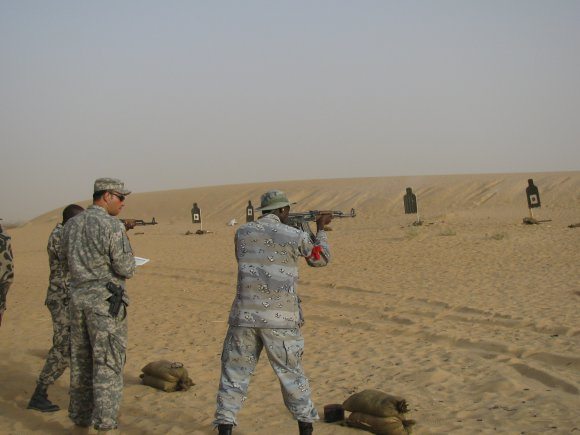West Virginia Army National Guard Special Forces Soldiers from Charlie Company, 219th Special Forces Group, along with the 300th Military Intelligence Battalion, the 294th Quartermaster Company and the 5th Quartermaster Battalion from Germany taught the Malian Defense Forces, or MDF, of the 33rd Parachute Infantry Regiment, how to effectively conduct drop zone selection, request aerial resupplies along with different methods of dropping supplies via air transport in order to maximize joint stability and security efforts.
Sgt. 1st Class Herschel Gillins, 21st Theater Support Command senior air operator, helped to familiarize the 219th Special Forces Group and the MDF soldiers with how to successfully conduct air drops in changing climate and altitudes. He says the Malian soldiers learned principles of patrol, tactical communications and aerial release ports.
“This training gives the Malians the ability to coordinate effectively and understand tactics the U.S. Army uses in order to provide a cohesive support system,” Gillins said.
Twenty-five U.S. and Malian Soldiers participated in an exercise to conduct aerial resupply drops during a five-day pathfinder familiarization course in Kingwood, W.V., which began Nov. 17.
Gillins and 14 other instructors familiarized Malian Defense Forces with U.S. military aerial drop techniques. The group also discussed comparable equipment and materials that Malian forces would be able to obtain in their country. Instructors used aerial shipping containers as well as supply delivery systems to provide both U.S. and MDF Soldiers insight as to what kind of equipment both organizations use.
“Mali Defense Forces want to extend the arm of their logistical capability and be able to provide humanitarian assistance in the farthest regions of Mali,” said Chief Warrant Officer Christopher Adkins-Castro of the 219th Special Forces.
“This capability gives the MDF the means to call for resupply and receive it while being secure in the drop zone during any threat whether it be drought, famine, or security, in which the military needs resupply,” Adkins-Castro said.
Military-to-military engagement participants from both countries say they learned a lot and hope to take those lessons with them back to their home stations.
“This training mission is very critical to everyone. It is beneficial any time we can equally reciprocate training so we can exchange tactics, techniques and procedures. This provides everyone the opportunity to learn how they conduct business and training, we have to learn as much from them as they do from,” Adkins-Castro said.
MDF Staff Sgt. Sidi Kola Gadiaga said his soldiers impressed him when learning about operations techniques and techniques of airborne drops, which is necessary for his country.
“This training mission is important to Mali because Mali is a big place. It is important that Mali soldiers are well trained and well equipped. We hope that the mission with the Americans will help with the materials that will be needed for airborne operations for the future,” Gadiaga said.
U.S. and Malian forces will use the knowledge gained from this training event to strengthen their effectiveness during Atlas Accord, a combined-joint-aerial-resupply exercise that will take place in Sevare Mali at the beginning of 2012. The bilateral exercise will mutually increase logistical and resupply capabilities for both militaries.
“Principally we learned the different techniques of airborne drops and different ways to recover equipment that has been dropped,” MDF Capt. Souley Barka said. “We hope to use these techniques to enrich our operations. Knowing how to do airborne drops helps us approach situations with a much larger tool set.”
Headquartered in Vicenza, Italy, U.S. Army Africa is the Army Service Component Command for U.S. Africa Command. Dedicated to positive change in Africa, U.S. Army Africa enables full-spectrum operations while conducting sustained security engagement with African land forces to promote security, stability, and peace.










